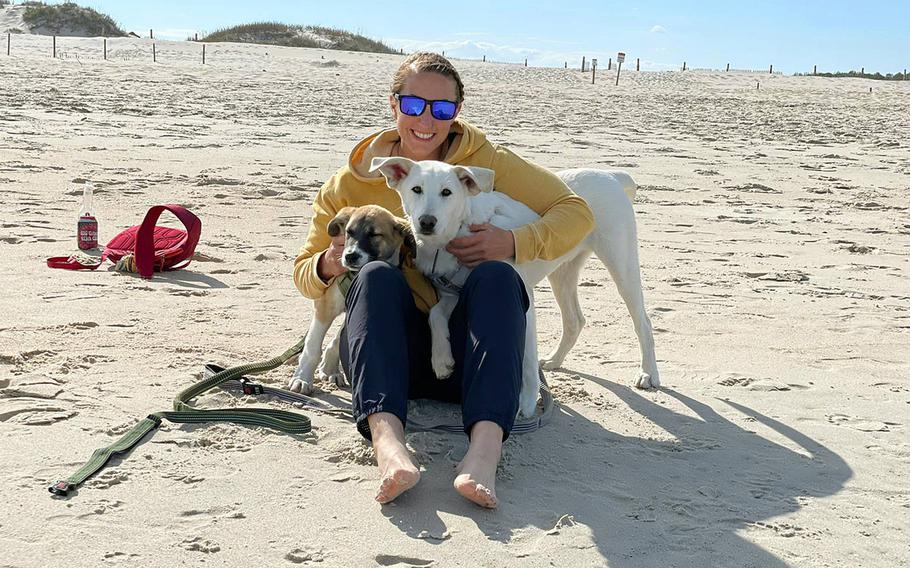
Staff Sgt. Katie Catania, an Army reservist, brought Charley, left, and Flea, right, back to the U.S. with her from Afghanistan. Catania said she was concerned about what would happen to the dogs. (Katie Catania)
KABUL, Afghanistan — Staff Sgt. Katie Catania found love at Kandahar Airfield, in the form of two puppies.
Charley is the playful one, while Flea is quiet and affectionate. Catania planned to choose one of them to keep, but the looming U.S. troop withdrawal from Afghanistan and the increasing violence in the country weighed heavily on her decision.
“I didn’t want to just leave one,” Catania said. “Not knowing the state of the base, and the country itself … If I could give these dogs a better life than just leaving them there in Afghanistan with an unknown future, then I was going to try.”
Catania, a logistics specialist who has since left Afghanistan, helped to move gear out of Kandahar over the past year during troop drawdowns. The U.S. is expected to complete its withdrawal of about 2,500 troops by Sept. 11, the White House said last week.
As troops leave, others like Catania are taking the dogs and cats they befriended on base with them.
Charlotte Maxwell-Jones, who runs a veterinary clinic in Kabul, helps prepare animals for the long flight from Afghanistan to the U.S. She’s received a number of urgent calls from service members in the past year as troop levels dropped from their peak of about 12,000 last year.
“People are calling from bases and saying, ‘can we move these animals out, ASAP?” she said, adding that of the dogs she shipped to the U.S. last week, two-thirds were for service members.
There is often a rush to move animals out when bases close, said Michelle Smith, executive director of Puppy Rescue Mission, which partners with Maxwell-Jones.
“If they’re shutting down camps and bases, we’ll see an increase in rescues,” Smith said, recalling a surge during the 2014 troop drawdown. “The guys who are shutting down that location don’t want to leave the animals behind that they’ve been feeding and caring for.”
Troops are not supposed befriend local animals, which can carry disease, but they often do.
“You’re so busy and you just miss regular stuff … you become attached,” said Chief Warrant Officer 3 Stephanie Hall, a helicopter pilot, who until February was deployed to the base at Kabul’s airport.
Hall brought back two dogs, Bennie and Mollie, and two cats, Playa and Kiaya.
Getting them from Afghanistan to America was at times incredibly difficult and complicated, Hall said, and cost more than $3,000.
But the process was worth it to ensure the pets she had cared for would get a good life, she said.
“I didn’t want to have regrets and not know what happened to them,” Hall said.
Catania drove to the airport last week to pick up Charley and Flea. Catania, an avid lover of outdoor sports, wants to bring the dogs to Utah.
“I’d really like to take them out hiking and exploring,” Catania said, “and just spoil them.”
lawrence.jp@stripes.com Twitter: @jplawrence3